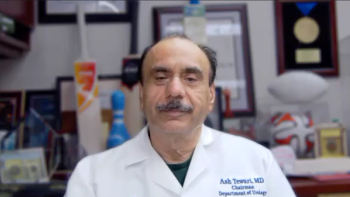
Chemo in Testicular Cancer Confers Increased CVD Mortality
Patients who have undergone chemotherapy for nonseminoma testicular cancer are at an increased risk for cardiovascular disease, especially in the first year after treatment.
Patients who have undergone chemotherapy for nonseminoma testicular cancer are at an increased risk for cardiovascular disease, especially in the first year after treatment, according to the results of a study
“On the basis of a population of more than 15,000 patients with nonseminoma, significantly increased cardiovascular disease mortality occurred after chemotherapy, with no excesses after surgery alone,” wrote Chunkit Fung, MD, of the University of Rochester Medical Center, and colleagues. “Our findings remain to be confirmed in analytic studies that also identify patients with testicular cancer at highest risk of thromboembolic events to formulate comprehensive, evidence-based approaches for risk stratification and reduction.”
According to the researchers, data are lacking on the risk for cardiovascular disease among testicular cancer survivors during or shortly after their treatment. To investigate this area further, they calculated standardized mortality ratios (SMR) for cardiovascular disease and absolute excess risks (AER) for more than 15,000 patients with testicular nonseminoma from the SEER program between 1980 and 2010. The patients were treated either with chemotherapy (n = 6,909) or surgery (n = 8,907) without radiotherapy.
Of all deaths not related to cancer, 24.2% were a result of cardiovascular disease. After undergoing chemotherapy, patients in the sample had a significantly increased risk for cardiovascular disease mortality (SMR, 1.36 [95% confidence interval (CI), 1.03–1.78]).
“Significant excess cardiovascular disease deaths were not observed in subsequent intervals, although SMRs in the intervals of 1 to 4 and 5 to 9 years were 1.67 and 1.20, respectively,” the researchers wrote.
No increased risk was seen for patients who only underwent surgery (SMR, 0.81 [95% CI, 0.60–1.07]).
The data showed that the excess deaths after chemotherapy occurred mainly within the first year after diagnosis (SMR, 5.31) with an absolute excess risk of 13.90; this included an increased risk for cerebrovascular disease (SMR, 21.72; AER, 7.43) and heart disease (SMR, 3.45; AER, 6.64).
The researchers conducted a multivariable analysis and found that the increased risk for cardiovascular disease mortality in nonseminoma survivors was isolated to the first year after diagnosis (HR, 4.86 [95% CI, 1.25–32.08]). In addition, distant disease and older age at diagnosis were also found to be independent risk factors for cardiovascular disease mortality.
“The relatively scant attention given to cardiovascular disease incidence or mortality during or immediately after cisplatin-based chemotherapy in patients with testicular cancer is noteworthy, in view of the growing literature in other cancers. In particular, in a largely curable cancer, the early development of any potentially fatal and preventable therapy-associated event is devastating,” the researchers wrote, adding that “the low absolute excess risk of early cardiovascular disease mortality reported here should not affect decisions to administer effective testicular cancer chemotherapy when clinically indicated.”
Newsletter
Stay up to date on recent advances in the multidisciplinary approach to cancer.






































